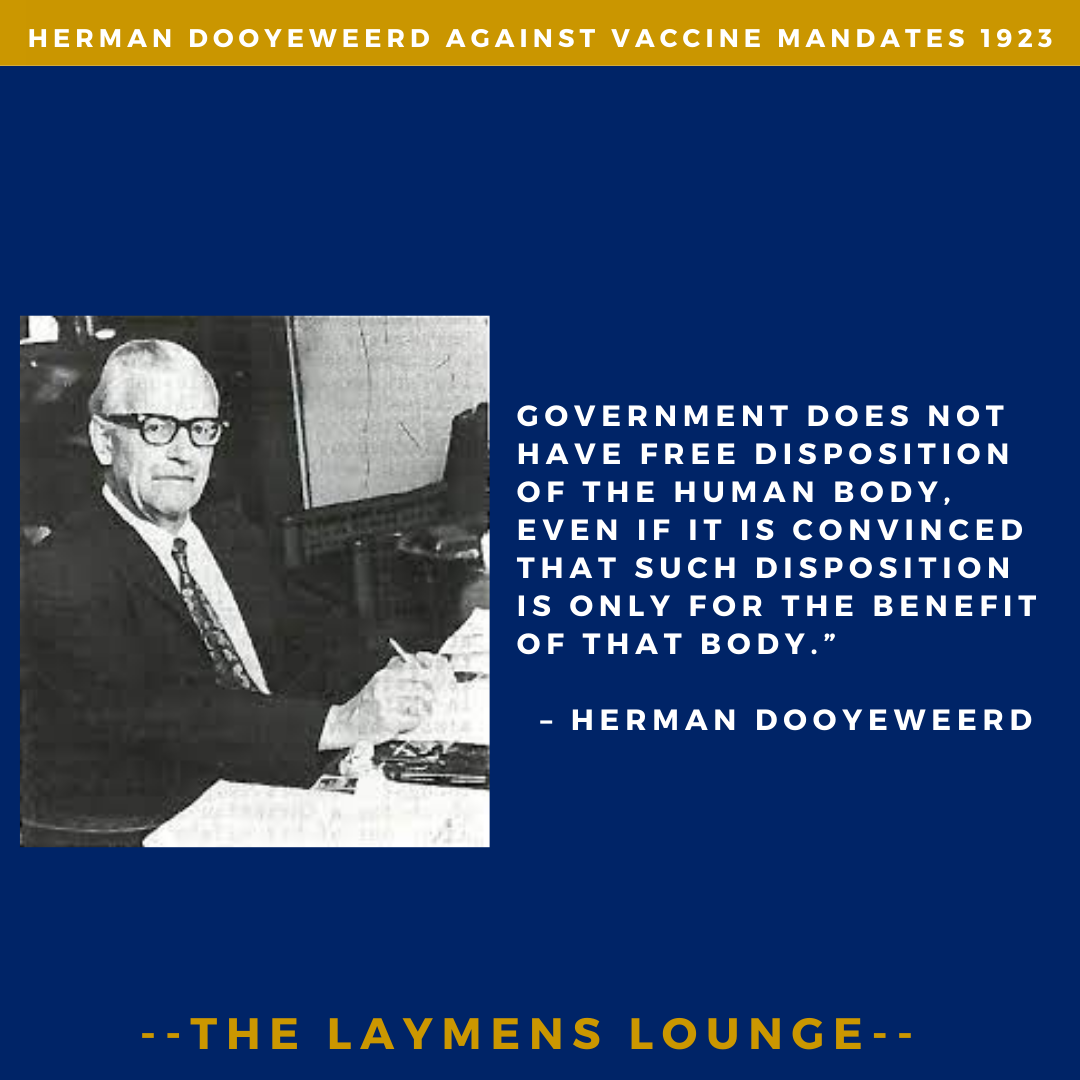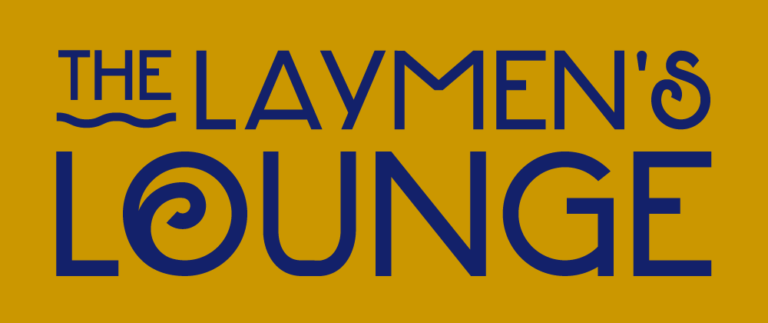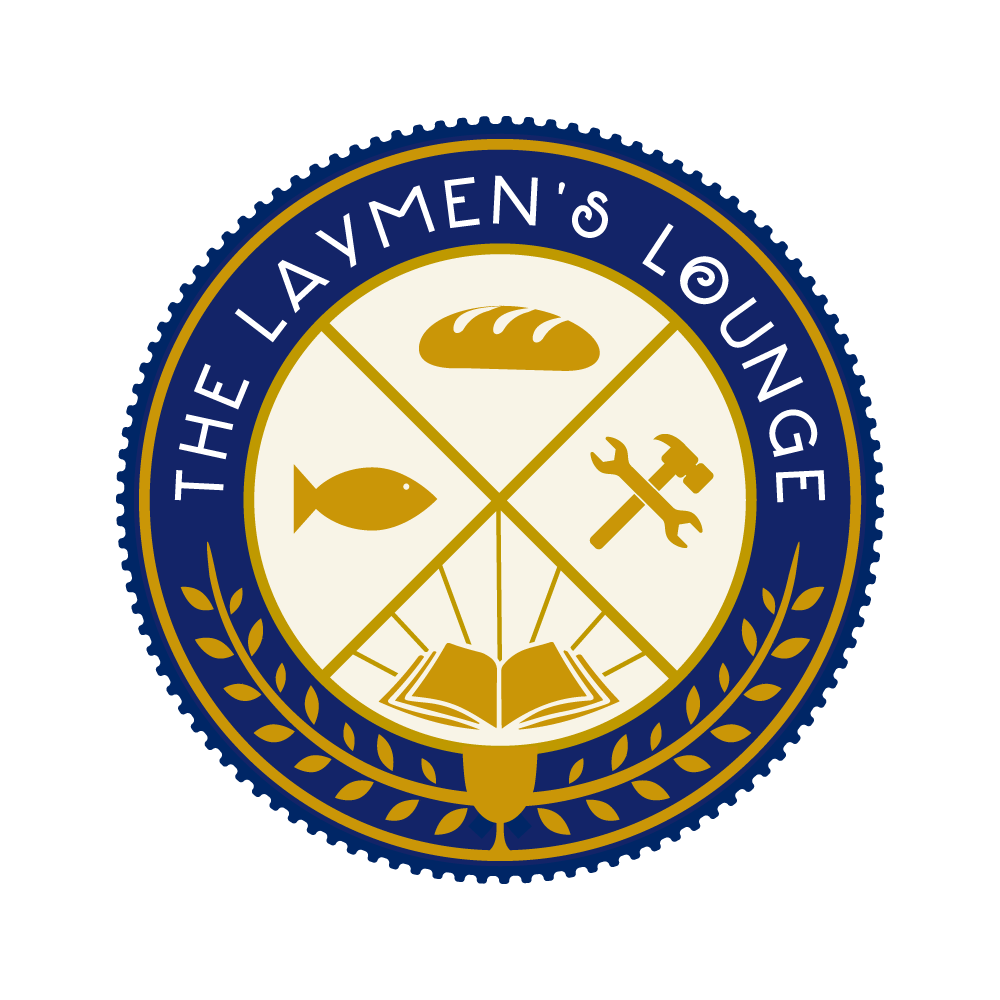by Gregory Baus
“Government does not have free disposition of the human body, even if it is convinced that such disposition is only for the benefit of that body.” – Herman Dooyeweerd

Herman Dooyeweerd (1894-1977) was a Reformed Christian philosopher and legal scholar from the Netherlands. For more about his life and work, see this article.
Before the bulk of his career as professor at the Vrije Universiteit Amsterdam from 1926-1965, Dooyeweerd spent about 5 years as director of the Kuyper Foundation, the policy institute of the Anti-Revolutionary Party. From 1922-1926 he produced several reports, including one in 1923 concerning compulsory or mandated vaccination by the civil government.
The report begins by saying that while some members of the political party are opposed to taking vaccinations, and others are themselves in favor of it, as a party they strongly oppose all civil government coercion of vaccination (For Abraham Kuyper’s view on government coercion of vaccinations click here). Particularly, the party consistently opposes all mandates of vaccination for government school attendance when the civil government requires schooling.
Dooyeweerd then lays out 5 main reasons all civil government coercion of vaccinations must be resisted and opposed.
- Compulsory vaccination violates God-given liberty of conscience.
- Only each person, and not civil government, has a God-given right as steward over one’s own body.
- Civil government has no God-given competence or jurisdiction to rule on medical/health issues.
- Native or endemic illnesses are never rightly treated by means of any coercion.
- Medical science can be flawed, and vaccinations can be more harmful than the illnesses they are intended to prevent.
The bulk of the report deals with the second main reason that coercive vaccination must be resisted and opposed. Dooyeweerd puts it this way: Civil “government does not have free disposition of the human body, even if it is convinced that such disposition is only for the benefit of that body.”
The term ‘disposition’ here refers to legitimate power or determination over something according to one’s own decision. In Matthew 20:15 where Jesus gives the parable about a generous employer, He illustrates “free disposition” asking rhetorically “Am I not allowed to do what I choose with what belongs to me?”
Dooyeweerd explains that responsive coercion is legitimate, of course, against anyone who is conclusively proved to be initiating coercion upon others. But simply being unvaccinated is not coercive in any way. Moreover, even if civil government officers were angelic geniuses who had infallible knowledge of what is best for you, and were entirely motivated by your best interest, even then they could never have the right to initiate coercion against you, because you don’t belong to them.
The issue here is not a matter of whether just laws should be enforced, but of what kind of legislation is actually just. And whether something is actually just or unjust is not ordained by civil government, but by God. Of course, the God-ordained principles of civil justice don’t enact legislation by themselves, but rather show the proper boundaries and provide guidance for legislation.
The main principle to which Dooyeweerd points is the Christian understanding of human beings as created by God as persons. (What he refers to as “ethical” personhood, he would soon, in the development of his philosophy, come to call the full “religious” personhood of every human). The first thing Dooyeweerd emphasizes is that this principle is in diametric opposition to slavery. Even though it might seem like an extreme comparison, vaccine compulsion is an expression of the same root as the evil of slavery (namely, the claim of owning, and/or having a right to control other people).
Most commonly, in the “classical liberal” or libertarian European political tradition that appreciates the inseparable connection between liberty and justice (the tradition of which the American “founders”, as well as Kuyper and Groen, were a part), this principle has come to be known as “self-ownership”.
But Dooyeweerd is concerned to describe it in terms of its fundamental, true religious grounding. While with respect to other people, it may be said you are indeed the proper “owner” of yourself (the alternative being slavery), in relation to our Creator to Whom we are ultimately accountable, we are only the respective stewards, the keepers and caretakers, each of our own lives. This is doubly so for those redeemed by Christ (1 Corinthians 6:19-20).
The political bottom line of this, Dooyeweerd insists, is the fact that civil “government may not, according to God’s ordinances, force the ethically free man to accept physical treatment in any form.”
We must entirely resist all such government injustice from the start, without hesitation or compromise, or else it will inevitably grow like a cancer. This is the principle of “obsta principiis.” You must have a zero-tolerance policy towards tyranny. “Whoever accepts compulsory vaccination in principle,” Dooyeweerd warns, “has deprived himself of the moral ground for opposing [any] such usurpation by government of individual liberty.”
* See here to read how Dutch theologian and Prime Minister Abraham Kuyper was pro-Vaccine but anti-coercion.
*For a statement of principles influenced by Dooyeweerd’s philosophy that seeks to develop opposition to tyranny more fully, see here.
Here is Herman Dooyeweerd’s full article:
“Report from the Dr Abraham Kuyper Foundation regarding Compulsory Vaccination”
By Herman Dooyeweerd, December 1923
(English translation by Ruben Alvarado, November 2021)
Though there may be opponents of vaccination among the Anti-Revolutionaries, the Anti-Revolutionary Party as such is not opposed to vaccination per se but to coercion. It is also known that many who are personally in favor of vaccination strongly object to government coercion (see e.g. the writings of Dr. Kuyper and de Savornin Lohman).
The Anti-Revolutionary Party has always opposed Article 17ff of the Act against Contagious Diseases, in which access to school is refused to those who can provide neither proof of vaccination nor (since the amendment of the law during the Heemskerk Ministry) proof that a medical objection to their vaccination exists.
In itself, there is no coercive element in this article. The provision in question contains only a conditional obligation for those who send their children to school. The law does not force anyone to send their children to school. The coercive element therefore lies only in the fact that the parents, who are reasonably and legally obligated to provide their children with primary education, are largely unable to pay for home education and are consequently actually forced to send their children to the school, by which the condition for the vaccine obligation is met.
The resistance of the Anti-Revolutionary side to this government coercion is mainly based on the following considerations:
1. Compulsory vaccination affects freedom of conscience and therefore puts physical well-being above the well-being of the soul.
It should also be noted that among the Anti-Revolutionaries only a few are found who have conscientious objections to vaccination, at least in so far as “conscientious objections” refers to “objections derived from religious conviction.” The chief conscientious objection consists in seeing in vaccination an assault on divine providence.
Dr. Kuyper contested this view (see De Gemeene Gratie); nevertheless, insofar as conscientious objections exist, the government should make way for them.
2. The government does not have free disposition of the human body, even if it is convinced that that disposition is only for the benefit of that body.
Perhaps that coercion would still be defensible if it were proved that an uninoculated person was so dangerous to his environment that coercion to ensure public health was inevitable. However, this has never been proven in any conclusive way. An unvaccinated person may be more susceptible to the smallpox disease than an inoculated, but he becomes dangerous only after he has the disease, and then only for those who do not wish to use the preventative measure (De Savornin Lohman in the explanatory memorandum for the draft bill for partial revision of the Epidemic Act presented to the House of Representatives of the States General by Royal Decree of 10 June 1890).
The objection raised here is of a very principled nature and must be discussed in some detail, because here the most basic questions of anti-revolutionary state law, the ethical limits of governmental authority, are called into question.
For this reason, too, a somewhat detailed discussion may be deemed desirable here, because political opponents often make light of this argument by referring to our defense of conscription, which certainly places a complete claim on the body, indeed on the entire person (so recently in the House of Representatives in an interruption during Rev. Kersten’s reflections about compulsory vaccination). The revolutionary view is that of the so-called “state power”. “The government may do everything,” they say, “that the law authorizes it to do.” Legally, this assertion is unassailable. Indeed, in terms of state law the government has not only the right but also the obligation to do everything the law prescribes, even if the implementation of the law would go against the ethical or religious convictions of industrial authorities [industriëele gezagsdragers].
But this proposition is not a solution to the question, because the question posed here is not of a state-legal but of an ethical-political nature. The question is not addressed to the executor of the laws, but to the legislator, who, when drafting the laws, has to take into account the limits which the ethical and religious order has placed on the task of the state. However evident this line of reasoning may seem, even on our part this boundary demarcation of the question is often infringed upon by mentioning unwritten rights against the government, which the government should not infringe in its laws. Such an appeal to “unwritten rights”, however common on our part, transfers the struggle into the wrong territory, that of state law. And in this area we have to yield. For indeed, if one were to speak of “rights” which would conflict with legal obligations, then one would have to reach the impossible conclusion that the law [recht] (lawful regulation) at the same time would be injustice [onrecht].
What are called “unwritten rights” must therefore be a misnomer. For indeed, if one puts the matter properly, behind the appeal to “unwritten rights” lies an inviolable truth, namely that the divine ordinances also put a limit on the scope of the legal order. The legislator who infringes these limits does not violate “unwritten rights” of the subjects but the divine ordinances.
It therefore comes down to the correct delineation of the ethical-political boundaries of the law. And this demarcation is so extremely difficult because the boundaries are not mathematically fixed but are, as it were, undulating lines that rise and fall with the ebb and flow of social life itself.
The Anti-Revolutionary principles only provide a guideline; they cannot conjure up the ready-made solution by themselves.
However, the above has already made clear that combatting the compulsion to vaccinate with an appeal to the right to one’s own body is completely untenable. Precisely this appeal to a “right to one’s own body” is a fruit of revolutionary state law with its “droits de l’homme et du citoyen”. It is a monstrous construction, wholly untenable from a legal point of view, and, moreover, a denial of the divine work of creation, which has made man not the owner, but only the steward of his God-created body.
So no right to your own body! But what then?
To answer this question we must first notice that the human body is inseparable from the ethical person of man. Only materialism, which denies the independent right of the ethical-personal, can be guilty of such separation. Why did the Christian mind revolt again and again against “man- and God-dishonoring” slavery? Precisely because by this servitude of the body the ethical personhood was ignored, because the slave was regarded as “res”, as a thing, which the master could dispose of as a piece of cattle. The legal order, which sanctioned slavery, was guilty of a transgression of the divine ordinances, which placed man as an ethical person in the midst of society. Personhood should never be infringed by the government. This is a guideline that every legislator must adhere to. However, the application of this standard is not always easy.
For so it will be said: the transition from slavery to the vaccine compulsion seems a bit over the top! Is vaccine compulsion a form of slavery? The question seems rhetorical, and a negative answer even seems superfluous to the smiling opponent. However, we do not hesitate to take this rhetorical question seriously. For the question is not whether slavery and vaccine compulsion are separated in their practical consequences by an almost unbridgeable chasm, but whether slavery is perhaps only a very gross outgrowth of the principle that ethical personhood has no independent value. And if vaccine compulsion were a first, let us say still very insignificant, fruit of this wild trunk, then the “obsta principiis” (nip it in the bud) already applies to us here!
The government may not, according to God’s ordinances, force the ethically free man to accept physical treatment in any form. The ethical person alone is appointed by God as the keeper and caretaker of the body.
But now the storm is unleashed from the other side! For then you must first of all take a stand against the forced cleansing of emigrants who want to cross the border. Should health measures taken in asylums and hospitals, insofar as they relate directly to the body, also be rejected? And – last not least – where do you stand with regard to the military draft that you have defended?
We never shy away from these arguments! Yes, the ‘forced’ cleaning of emigrants! We indeed do not oppose it; on the contrary we applaud it, we consider it a duty of the government. Only, we do not admit that it is on a par with forced vaccination.
After all, no law obliges the emigrant to cross our borders, like a compulsory education law in this country which obliges parents to have their children educated and, failing the possibility of home schooling, to send them to school! Emigrants can therefore avoid cleaning and disinfection at the quarantine stations at any time, simply by not crossing our borders. So no coercion is imposed on the person of the emigrants. They have had the opportunity to consider whether they will accept the treatment or not. And the same is the case with regard to physical treatment in hospitals or asylums; insofar as one is admitted voluntarily, the personhood itself has decided that it should submit to these measures; insofar as the admission is involuntary, this is either a proof of the inability of the person to take care of his own body (insanity) or it is a punitive measure directed against the person as a punishment.
And then military service! The state here indeed has the power over the labor power, yes, the life of the ethical personhood. For here the state does not take free disposition over the body of the conscripts. It calls them to a matter which can involve life and death, but does not intervene in that body itself. The soldier is only obliged to defend his country, not to passively undergo a treatment of his body. Only insofar as conscientious objections would arise in some people against conscription would the ethical personhood be compromised. In this case, the Anti-Revolutionary side also insists on respect by the authorities for such objections.
But then, it will be asked, except in cases of punishment or moral inability to take care of my body myself, is not a single case conceivable in which the government should be granted the right to have the subjects undergo compulsory treatment of their bodies? This question must not be answered in the negative, just as from our side a reserve is also made for cases of absolute necessity, in which the neglect of certain precautions would constitute an urgent danger to public health. On what then is this right of exception based? On the undeniable duty of government to protect public health. When e.g. in times of cholera or typhoid epidemics, vagrants in a far-reaching state of uncleanliness move about, the government should intervene because here the sense of moral responsibility apparently falls short individually and, as a result, the lives of others are endangered. “Thou shalt not kill” is a commandment which applies not only to deliberate, but also to culpable acts. In such cases, the government must take preventive action, because it has to protect the lives of its subjects.
But then there must also be a communis opinio (consensus) that, indeed, the failure of a person to take certain precautions poses an acute danger to public health. The loopholes are very tight [de grenzen sluiten heel nauw] and, as Mr. de Savornin Lohman already noted in 1890, with regard to vaccination, such a case provides no room for establishing a [general] position.
The “obsta principiis” is all the more powerful here, because more and more voices have been raised of late giving the government the right to treat other diseases as well, such as tuberculosis and venereal diseases, and to prescribe coerced treatment of the body.
In foreign countries, tuberculosis laws already exist under which the government can even remove tuberculous patients from their homes against their will and have them admitted to a hospital for forced treatment. Whoever accepts compulsory vaccination in principle has deprived himself of the moral ground for opposing such usurpation by government of individual liberty.
The unremitting struggle against mistaken principles is therefore our duty.
3. The government may not take sides in a medical question. With this objection it is pointed out that there are doctors who doubt the usefulness of vaccination.
4. Cholera and plague epidemics have not occurred in recent years any more than smallpox epidemics. And yet, the Epidemic Act does not prescribe the forced vaccination of children against plague and cholera. It cannot therefore be said that the absence of smallpox is due to vaccination.
Whenever this is brought up, however, it is overlooked that smallpox cannot simply be equated with cholera and plague. Smallpox here used to be chronic, now it is sometimes sporadic, sometimes epidemic; it is a native disease. Plague and cholera, on the other hand, are exotic diseases which can therefore arise only by introduction from abroad. Therefore, theoretically speaking, with regard to the latter diseases, preventive power can be attempted in surveillance at land and sea borders. Prevention cannot and need not go further here. In the case of an indigenous disease such as smallpox, however, one must also be mindful of preventing the occurrence of this disease in the interior itself. It can be admitted that vaccination is not considered necessary as a preventive measure against the introduction of this disease from abroad. However, there is always the danger of the development of sources of infection at home. Therefore, the promotion of vaccination by the government, provided it is not through coercion, is by no means to be frowned upon.
5. There are those who, for fear of ill-effects, dare not take upon themselves the responsibility of vaccinating themselves or their children.
It should be noted that despite the favorable results shown by statistics, no matter how many precautions are taken, in some cases disadvantage results from vaccination. We point by way of example to cases in which the physician misdiagnoses the patient’s state of health before vaccination.
As can be seen from the foregoing, we cannot assign the same value to every argument put forward against compulsory vaccination. Even if one disregards the, in our view, weaker arguments, strong fundamental objections still apply to compulsory vaccination in its present form. Promotion of, but not coercion to, vaccination may emanate from the government.
So the question is: In what direction should our party work to put an end to this compulsion?
[Here follows a discussion of previous legislative attempts by Savornin Lohman and Kuyper]
Here then are some attempts to meet well-founded objections to vaccination.
As is known, the government is now reconsidering the way in which objections to vaccination can be taken into account without harming public health. The relevant bill has not yet been submitted.
It merits attention, however, that recently from the liberal side as well (e.g. in the Utrechtsche Dagblad) voices have been raised advocating that emotional objections against vaccination also be legally respected.
We are pleased that this proper view of the matter is also beginning to break through among our political opponents.
Gregory Baus is writing an M.A. thesis on Herman Dooyeweerd’s philosophy at North-West University in South Africa. He first began studying Dooyeweerd in 1994, and formerly attended the Vrije Universiteit, Amsterdam. His personal interests include classic diners, folk music, and speculative fiction.
EDITOR’S NOTE: For more neo-Calvinist (biblical) view on the role and reach of the government listen to Dr. Joe Boot’s lecture “Sphere Sovereignty and State Absolutism.” I know of nothing more compelling and accurate than this.



Hello, Mr Baus, I have not read this entire page; please pardon me if I missed a relevant portion. However, I’m not yet convinced that Kuyper or Dooy would have proscribed vaccination mandates in the case of the current (2020-2021) coronavirus pandemic. Your remark here is relevant: “Perhaps that coercion would still be defensible if it were proved that an uninoculated person was so dangerous to his environment that coercion to ensure public health was inevitable.” At present, an unvaxxed person is indeed dangerous to public health. Plus, I think applying Dooy’s philosophy requires considering the social & cultural context,… Read more »
Andrew, it would first have to be conclusively proven that the uninoculated person was actually infected before it could even possibly be shown that the actually infected (not merely uninoculated) person was 1) contagious and 2) demonstrably infecting others, and then furthermore it would have to be conclusively proven that this actual spreading of actual infection constituted 3) initiation of coercion towards others so as to justify the use of any proportional responsive coercion against him or her, which in any case rules out use of vaccine (since infection is already present). Think that over and you will see that… Read more »
Here’s a little background on the document: It is mentioned on page 67 in the [English translation of the] intellectual biography of Dooyeweerd by Marcel Verburg under “Further White Papers”. https://www.amazon.com/dp/0888152086/ It is also listed a little more than half-way down page 126 in the HDC [Historisch Documentatiecentrum voor het Nederlands Protestantisme] Dooyeweerd archive at the Vrije Universiteit Amsterdam, here: https://www.hdc.vu.nl/nl/Images/077_Dooyeweerd_H_tcm215-773566.pdf#page=126 [Vaccinatiedwang, rapport van de Kuyperstichting, 1922-1923]. If anyone wants a copy of the Dutch-language original, they are welcome to contact me and I can send it to them. My email is ideologATgmailDOTcom. I have sent copies to more than… Read more »
It is now abundantly clear that agents of govt pushing masks, lockdowns and vax were bought by pharmaceutical companies in a fascistic bed with govt, and many “scientists” were also paid-off or under govt threat.
It is also quite clear that neither mask policy nor lockdowns were effective, but rather were overall harmful (esp to the poor), and that vax has contributed to more deaths.
Govt agents need to answer for this evil they’re responsible for, and those who advocated for it (esp those who claim to represent a Neocalvinist view) should be ashamed and need to openly repent.